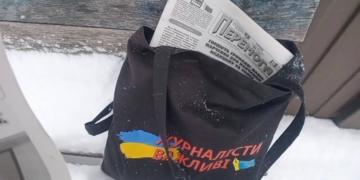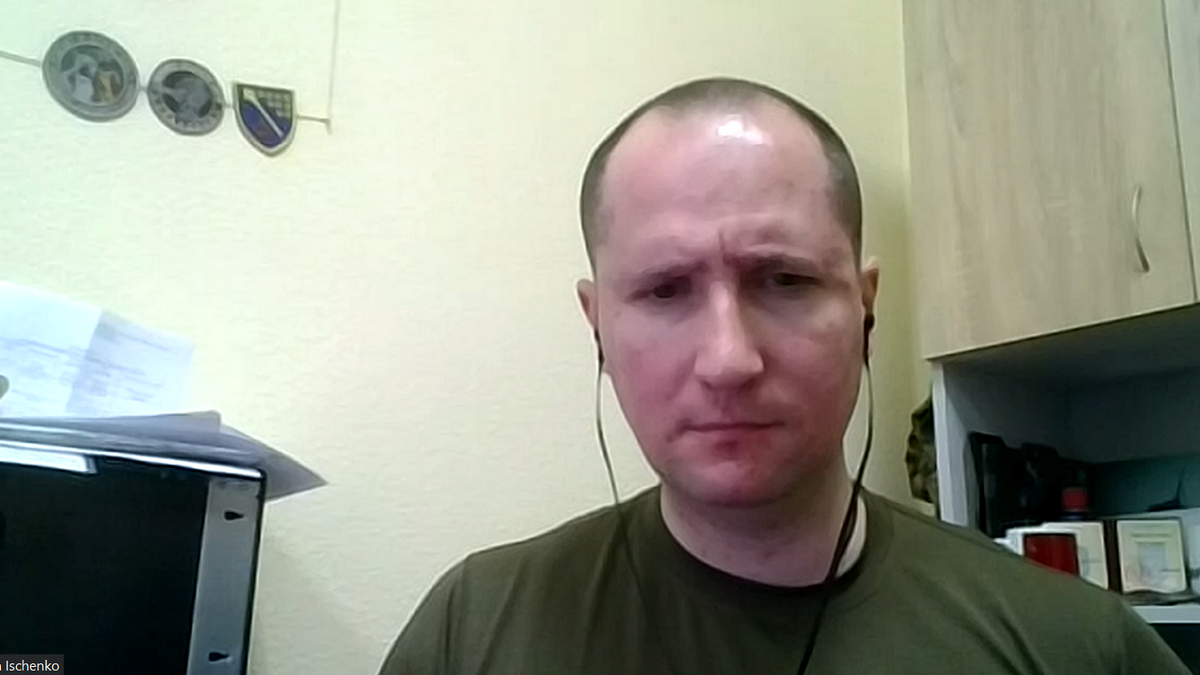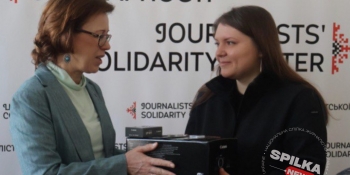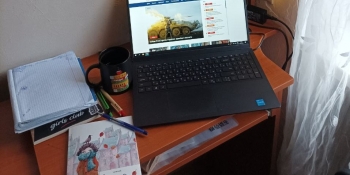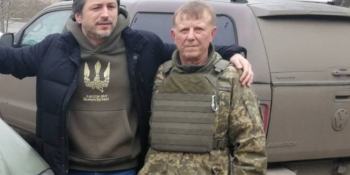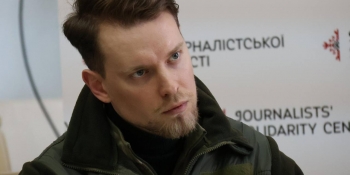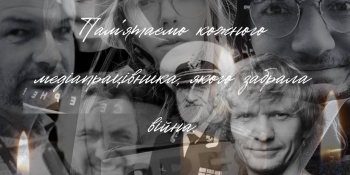Taras Topolia, the lead singer of the band Antytila, was driving the car carrying the wounded military journalist Danylo Ishchenko, Danylo said during a recent online meeting with colleagues organized by the National Union of Journalists of Ukraine (NUJU).
“Taras was the senior in the group of paramedics, and it was he to drive the armored car that took me away. Of course, I would like to single out the entire team, because each of them contributes to the Victory,” says Danylo Ishchenko.
Danylo Ishchenko, who was seriously injured and lost his leg on June 1, 2022, spoke for the first time about the circumstances of this dramatic event during an online meeting at the NUJU on Friday, February 10.
The journalist was part of the mobile press group of the Ministry of Defense, which covered the liberation of the Kharkiv Region. The shooting was carried out at the location of the deployment of a group of paramedics, which included representatives of the Antytila band. When the shelling began, sappers came to the paramedic shelter, and the paramedics and journalists were let through. Danylo Ishchenko was the last to enter. It was at this moment that an enemy mine fell nearby.
After losing his leg, Danylo had to undergo treatment and rehabilitation for a long time. Colleagues from the NUJU and foreign benefactors provided him with financial and other assistance. Currently, Danylo has already returned to work at the Armiya FM radio studio, dreams of getting a modern prosthesis in the United States and writing a book. It should be a collection of stories about tragic, dramatic, and sometimes funny events that Ishchenko witnessed since 2014.
As Sergiy Tomilenko, the President of the NUJU, noted, the Union, having learned about the injury of a colleague, maintained contact with his relatives from the first day.
“Bohdana Stelmakh, a coordinator of the Journalists’ Solidarity Center in Lviv, where Danylo underwent rehabilitation, directly took care of his recovery. The fate of Danylo was actively concerned with the Chernihiv regional organization, which at one time accepted him to the NUJU. All comrades and friends of Ukrainian journalists from abroad joined in supporting the colleague, in particular the Japanese Foundation of Future Generations and the Lithuanian Union of Journalists,” Sergiy Tomilenko emphasized.
The President of the Union added that from February 24, 2022, the NUJU will operate a hotline to help colleagues who need support or are in trouble.
“We keep in touch with those who escape from the occupation, are victims of insidious Russian aggression, we provide all kinds of assistance, we turn to international partners for support,” Sergiy Tomilenko said. “With their support, we launched a network of the Journalists’ Solidarity Center, through which we unite all people of good will to help journalists.
Danylo Ishchenko expressed his gratitude to everyone who participated in his rescue, treatment and recovery, stressing that with this “our journalists’ family showed its best qualities, proved that we do not abandon each other, we save each other, even in the most difficult times of war we do not forget about professional duties. He added that the financial assistance came in very handy for his family, as the treatment was not cheap.
Answering the question of how he manages to keep his strength after going through such trials, Danylo Ishchenko said:
“Of course, I have certain elements of psychological burnout. But I find strength in the fact that we, our country, our people have persevered despite all that we have experienced. If we have successfully overcome the long nine-year war in Donbas, a year of severe trials of full-scale aggression, then we will be able to overcome the next challenges that fate throws at us,” emphasized Danylo Ishchenko. “I can’t say that I was “privileged by fate.” This situation could happen to anyone. This happened to me while performing professional duties. I knew that I was taking a risk, that I was taking responsibility for my fate and the fate of the people I work with. Therefore, it would be wrong to scold yourself and think how bad it is that this happened. It happened as it happened. The main answer to where I get strength and optimism will be the statement that I see people who do their work well. I try to take an example from them.
Danylo Ishchenko answered numerous questions of the participants of the meeting.
Commenting on its results, First Secretary of the NUJU Lina Kushch noted that the experience and advice of military journalists are invaluable, as they help preserve life and health in dangerous conditions. NUJU is working on equipping colleagues with knowledge and skills on how to work in a combat zone, how to provide first aid, how and what to protect yourself and those around you.
Answering the question about the most important advice he could give to journalists working in war-torn conditions, Danylo Ishchenko emphasized that the most important thing is to obey the instructions of press officers and other military personnel who accompany media workers in the war zone.
“A media worker can only work where it is more or less safe. Because if you get to the place of a combat collision, then you have to think only about survival, and you have practically no opportunity to shoot something useful. The military will help you find a safe place. Therefore, my main advice is to enter into close interaction with the press services of the brigades and the General Staff.
Maksym Stepanov, NUJU information service





